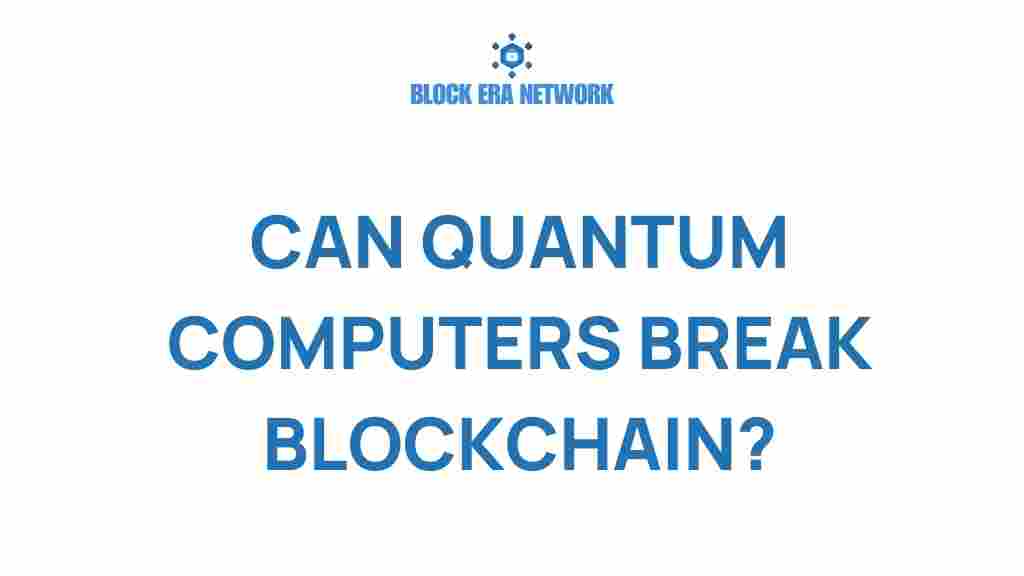Can Quantum Computers Break Blockchain?
As we venture into the future of technology, one question looms large in the minds of digital security experts, developers, and everyday users: can quantum computers break blockchain? With the rapid advancement of quantum computing, the implications for blockchain technology and its inherent security features are significant. This article will explore the intricate relationship between quantum computers and blockchain technology, focusing on the future of digital security, cryptography, and the protection of digital assets against emerging cyber threats.
Understanding Blockchain Technology
Blockchain is a decentralized ledger technology that securely records transactions across multiple computers. This technology has revolutionized the way we think about data integrity and security. Here are some key features of blockchain:
- Decentralization: No single entity controls the entire network.
- Transparency: All transactions are visible and immutable, promoting trust.
- Security: Cryptographic methods protect data integrity and confidentiality.
Blockchain has become the backbone for various applications, including cryptocurrencies, smart contracts, and supply chain management, making it imperative to understand how emerging technologies like quantum computing may impact its security.
The Rise of Quantum Computers
Quantum computers leverage the principles of quantum mechanics to perform calculations at unprecedented speeds. Unlike classical computers, which use bits as the smallest unit of data (0 or 1), quantum computers use qubits that can exist in multiple states simultaneously. This capability allows quantum computers to solve complex problems much faster than traditional computers.
However, this powerful technology brings with it potential risks, particularly concerning encryption and data security. Here’s why:
- Shor’s Algorithm: This quantum algorithm can factor large integers exponentially faster than the best-known classical algorithms, posing a threat to RSA and ECC, two widely used encryption methods in blockchain.
- Grover’s Algorithm: This algorithm can effectively reduce the security strength of symmetric-key cryptography, making it easier for quantum computers to break encryption.
Quantum Threats to Blockchain Security
With the potential of quantum computers to undermine existing cryptographic techniques, the security of blockchain is at risk. Here are specific ways quantum computers could threaten blockchain:
- Breaking Cryptography: As mentioned, quantum computers can potentially break the cryptographic algorithms that secure blockchain networks.
- Stealing Private Keys: If quantum computers can break encryption, they could potentially steal private keys, allowing unauthorized access to digital assets.
- Disrupting Consensus Mechanisms: Quantum computers could manipulate the consensus algorithms that validate transactions, leading to instability in blockchain networks.
The Future of Digital Security
As we look to the future, the question remains: how can we protect blockchain technology from quantum threats? Here are several strategies being explored:
- Post-Quantum Cryptography: This involves developing new cryptographic algorithms that are secure against quantum attacks. Organizations like NIST are actively working on standardizing post-quantum cryptographic algorithms.
- Hybrid Cryptographic Solutions: Combining classical and quantum-resistant cryptographic techniques can offer a layered security approach.
- Upgrading Existing Blockchains: Some blockchain projects are already exploring upgrades to incorporate quantum-resistant features.
Step-by-Step Process: Preparing for Quantum Resilience
To safeguard blockchain technology against quantum threats, organizations can follow a structured approach:
- Assess Current Cryptographic Practices: Evaluate the existing encryption methods in use and identify vulnerabilities.
- Research Post-Quantum Solutions: Stay informed about advancements in post-quantum cryptography and consider integrating these solutions.
- Implement Hybrid Systems: Develop systems that utilize both classical and quantum-resistant cryptography.
- Educate Stakeholders: Provide training and resources to ensure that all stakeholders understand the implications of quantum technology.
- Monitor Developments: Keep an eye on advancements in quantum computing and cryptography to adapt strategies accordingly.
Troubleshooting Quantum Security Issues
As organizations begin to implement quantum-resistant strategies, they may encounter challenges. Here are some common issues and troubleshooting tips:
- Integration Challenges: Legacy systems may have difficulty integrating with new cryptographic methods. Consider phased rollouts and extensive testing.
- Performance Concerns: New algorithms may introduce latency. Optimize implementations for performance while maintaining security.
- Lack of Awareness: Some stakeholders may not understand the importance of quantum security. Create informative materials and host workshops to raise awareness.
The Role of Education in Quantum Security
Education plays a crucial role in preparing for the future of digital security in the age of quantum computing. Here are some avenues for education:
- Online Courses: Many platforms offer courses on quantum computing and post-quantum cryptography.
- Webinars and Workshops: Participate in industry-specific webinars to gain insights from experts.
- Conferences: Attend conferences focused on cybersecurity and quantum technology to network and learn about the latest developments.
Conclusion: Embracing the Future of Security
As we move towards a future dominated by quantum technology, the security of blockchain and digital assets must evolve. While quantum computers pose a significant threat to current cryptographic practices, proactive measures, such as adopting post-quantum cryptography and hybrid security solutions, can help safeguard our digital future.
In conclusion, the question, “Can quantum computers break blockchain?” highlights the need for continuous innovation in security practices. By staying informed and prepared, we can embrace the future of technology with confidence, ensuring the integrity and security of our digital assets against emerging cyber threats.
For more insights into the intersection of technology and security, check out this comprehensive guide to blockchain security.
To learn more about quantum computing and its implications for digital security, visit this informative resource.
This article is in the category Crypto Security and created by Block Era Network Team
